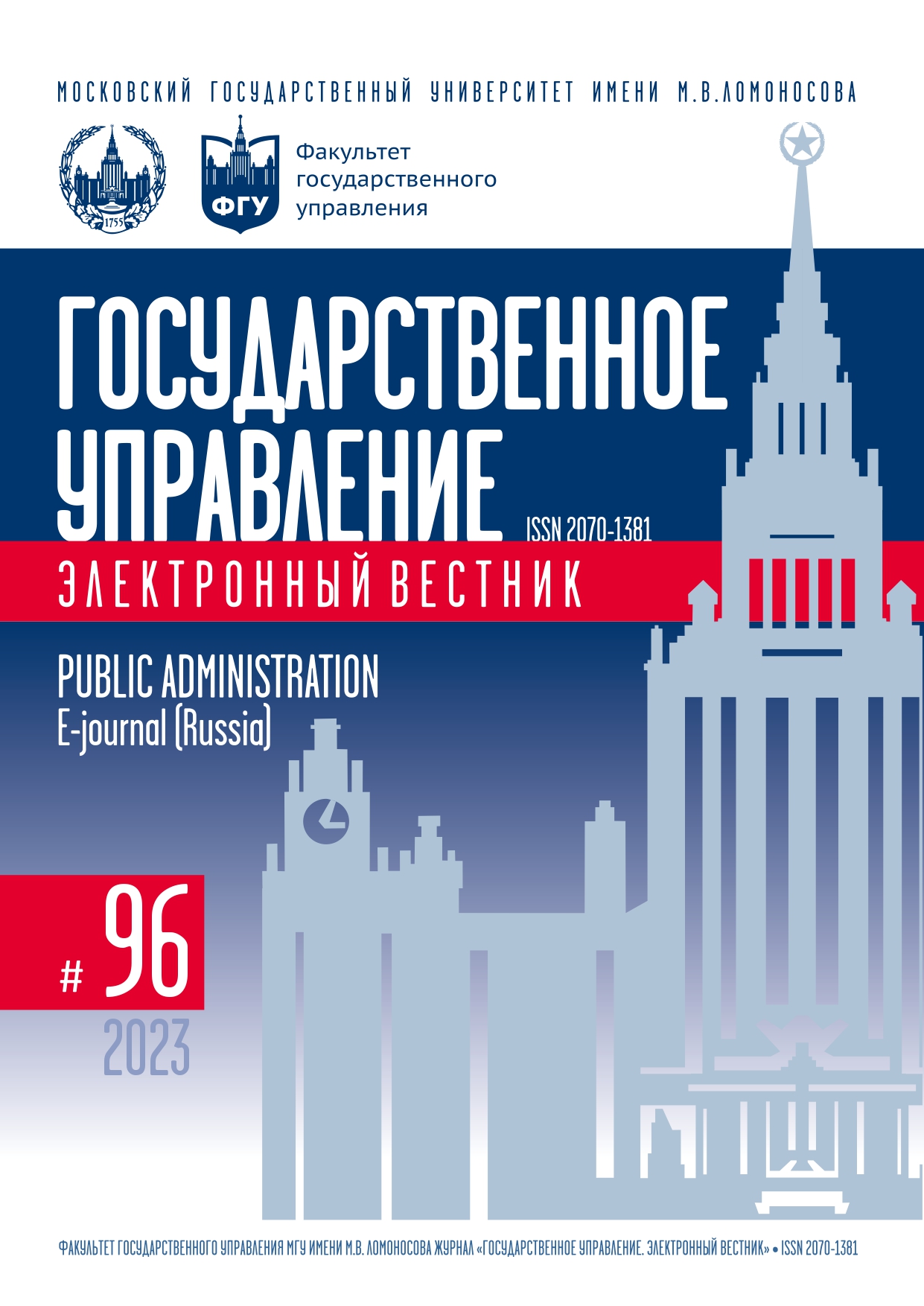All-Russian Civic Identity: Conceptual Foundations and Regional Implementation
Keywords:
State unity, civic consciousness, identity, ethnos, culture, religion, North Caucasian Federal DistrictAbstract
The article investigates the evolution of ideas concerning the importance of all-Russian civic consciousness reflected in official documents, as well as the current state of civic identity based on the material of individual regions of Russia. The subjects of the federation belonging to the North Caucasian Federal District, where negative trends associated with the political role of ethnicity are still strong, were chosen as the object of analysis. The results of a content analysis made by regional scholars led to the conclusion that, in general, the all-Russian and ethno-cultural components occupy an equal position in local identity politics. At the same time, in the laws on educational, cultural and language policy, there is a preponderance of provisions that institutionalize the ethno-cultural component. According to experts, the all-Russian identity prevails in Kabardino-Balkaria, Karachay-Cherkessia, Stavropol Territory and North Ossetia — Alania. Its position is much weaker in Dagestan, Chechnya and Ingushetia. A number of researchers note that the main factor in the unity of the nation for the residents of the North Caucasus Federal District is the existence of a common state. The article analyzes the obstacles that hamper development of the all-Russian civic identity in the North Caucasus. These are, for example, the lack of the clear notions related to the contents of the civic identity and deep contradictions in understanding the common past of Russia. The all-Russian civic identity is not firmly rooted in the minds of the population and often conflicts with other forms of self-consciousness. The negative impact on the strengthening of civic identity has a violation of legal norms, clannishness, corruption, lack of social lifts, etc. All this necessitates targeted work to correct shortcomings, in which representatives of various government departments, societal organizations and expert community should unify their endeavors.
References
Авдеев В.А., Воробьев С.М. Общероссийская гражданская идентичность молодежи Северного Кавказа: основные вызовы и риски конфликтности // Политическая экспертиза. ПОЛИТЭКС. 2021. Т. 17. № 1. С. 69–86. DOI: 10.21638/spbu23.2021.106
Авксентьев В.А., Аксюмов Б.В., Гриценко Г.Д., Иванова С.Ю., Шульга М.М. Формирование российской идентичности на Северном Кавказе: институциональные и социокультурные рамки // Политическая экспертиза. ПОЛИТЭКС. 2022. Т. 18. № 1. С. 72–86. DOI: 10.21638/spbu23.2022.105
Адиев А.З., Щербина Е.А. Общероссийская идентичность на Северном Кавказе: pro et contra // Вестник Российской нации. 2021. № 3. С. 54–63.
Адиев А.З. Общероссийская идентичность в Дагестане (по данным опросов 2016–2019 гг.) // Социологические исследования. 2021. № 4. С. 136–142. DOI: 10.31857/S013216250011312-6
Ерохин А.М., Авдеев Е.А., Воробьев С.М. Национально-государственное наследие СССР в представлении молодежи Северного Кавказа // Политическая экспертиза. ПОЛИТЭКС. 2022. Т. 18. № 1. С. 87–107. DOI: 10.21638/spbu23.2022.106
Кольба А.И., Чадаева Э.Т. Тенденции развития и политической институционализации региональных конфликтов в республиках Северного Кавказа // Политическая экспертиза. ПОЛИТЭКС. 2021. Т. 17. № 3. С. 273–287. DOI: 10.21638/spbu23.2021.304
Тишков В.А. Российский народ. История и смысл национального самосознания. М.: Наука, 2013.
Федякин А.В. Приоритеты государственной культурной политики Российской Федерации и императивы укрепления общероссийской национальной идентичности // Вестник Российской нации. 2021. № 4. C. 9–45.
Omelchenko E., Poliakov S., Mayboroda A. Peers/Strangers/Others? The Youth of Dagestan in Search of Group Identities // Cultural Studies. 2019. Vol. 33. № 5. P. 841–865. DOI: 10.1080/09502386.2018.1544650
Pokalova E. Islamic Radicalization in Russia’s North Caucasus: Lessons from Russia’s Handling of Religious Revival // Journal of Balkan and Near Eastern Studies. 2019. Vol. 21. Is. 2. P. 146–169. DOI: 10.1080/19448953.2017.1367587
Sangaliev A.A. Ethnic Clan Politics in the Post-Soviet Space // Russian Social Science Review. 2010. Vol. 51. Is. 1. P. 56–71. DOI: 10.1080/10611428.2010.11065383
Downloads
Published
Issue
Section
Categories
Similar Articles
- Zoya R. Vysotskaya, Actualization of Identities among the Youth. Part 1: Problem Statement and Research Methodology , Public Administration. E-journal (Russia): No. 86 (2021)
- Varvara A. Sazhina, The Concept of «Russian Nation» and Formation of Civic Identity in the Perception ofthe North Caucasus Youth , Public Administration. E-journal (Russia): No. 97 (2023)
- Maxim A. Budanov, Problem of Quasi-Civilization Projects in the Context of Nation-Building Tasks in Russian Federation , Public Administration. E-journal (Russia): No. 90 (2022)
- Maxim A. Budanov, Constructivist Aspects of National Myth-Making in the Post-Soviet Space , Public Administration. E-journal (Russia): No. 94 (2022)
- Maxim A. Budanov, Alexander Yu. Polunov, The Current Religious Situation in Russia: Challenges and Opportunities , Public Administration. E-journal (Russia): No. 108 (2025)
- Yuri V. Naiderov, Sochi Sub-Region as a Political and Administrative Unit: Features and Perspectives , Public Administration. E-journal (Russia): No. 87 (2021)
- Dinara D. Tulegenova, Patriotism in the Views of Russian Youth: A Political and Psychological Analysis , Public Administration. E-journal (Russia): No. 108 (2025)
- Irina V. Loguntsova, Special Features of Russian Arctic Tourism , Public Administration. E-journal (Russia): No. 87 (2021)
- Zaur R. Gapizov, Цивилизационный идентитет населения Крыма как фактор интеграции в российское пространство , Public Administration. E-journal (Russia): No. 85 (2021)
- Elena A. Rossoshanskaya, Tatyana A. Doroshenko, Natalia A. Samsonova, Elena L. Li, Michael E. Kuznetsov, Elena Yu. Ageshina, Agent-Based Demographic Model of the Far East as a Tool to Support Management Decision Making , Public Administration. E-journal (Russia): No. 94 (2022)
You may also start an advanced similarity search for this article.




